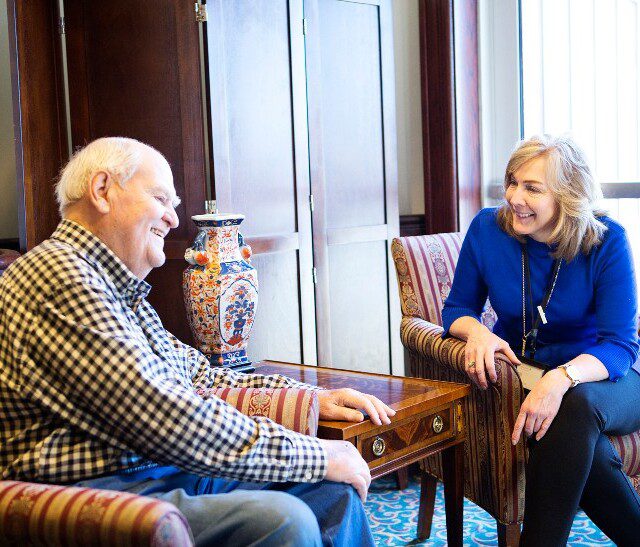When you are preparing to explore your options for a senior living community, do you know what to look for? It can be difficult to differentiate between communities, making it difficult to determine which senior living community best fits your wants and needs. We can help ease the process by filling you in on what a CCRC is, what you can expect from a Life Care contract and what questions to ask as you find a community to call home.
What is a Continuing Care Retirement Community (CCRC)?
A continuing care retirement community (CCRC) is a senior living community that provides the care you need, both now and into the future. Because no one knows for certain what the future holds, the best you can do is be prepared. A CCRC is built on the concept of providing a full continuum of care, offering health-focused services like skilled nursing, assisted living and rehabilitation for residents who may need a greater level of care later in life.
You may also see CCRCs referred to as Life Care communities, and that means residents have a Life Care contract. For seniors who wish to live in a Life Care community, there is an application process. The contract will outline the services and amenities that a resident is entitled to as well as the financial and nonfinancial aspects of residency. The amount of your entrance fee and monthly fee will depend on what type of contract you signed.
The three different types of Life Care contracts are Type A, Type B, and Type C. If you sign a Type A contract, you are entitled to unlimited access to the various levels of care provided by the community for little to no change in monthly fees. For a Type B contract, rather than unlimited access, you are provided access at a discounted market rate or a fixed number of “free” days of health services for a set length of time. The upside is that you will typically have a lower entrance fee. Finally, a Type C contract agrees to provide the resident with the basic services and amenities entitled to each resident, but additional health services will be charged at full market rates. The trade-off is that the entrance fee and monthly fee is the lowest of all three types, but health care costs can add up quickly with this type of contract.
Questions to Ask of a CCRC
When you get a chance to ask questions of a CCRC, make the most of the opportunity. That means asking the questions that are going to best help you determine if their community is a place you could call home. Here are a handful of questions to get you started.
What type of contract do you offer?
There are three different types of contracts, but you won’t find all of them at every CCRC. Take for example Claridge Court. Here, we offer residents Type A contracts. So one of your first questions for a CCRC under consideration should be what type of contracts they offer. If their contract type does not mesh with your financial means, you can cross them off the list.
What is your entrance fee and what does it include?
You know there is going to be an entrance fee, but what exactly is that one-time upfront fee paying for? Every CCRC should be able to answer that question. Often you’ll find that it prepays for a portion of the fees required for access to the different levels of health care. You may also want to ask how the entrance fee is calculated. Generally, entrance fees are determined by the size of the residence and the number of occupants in the living space.
What is included in your monthly service fees?
Typically, the service fee you are charged each month as part of your contract with a CCRC covers a portion of the cost of the services and amenities provided to residents. But when you’re a prospective resident weighing your senior living community options, it never hurts to ask what specific services and amenities are being funded by the monthly fee.
What services are available on-site?
General services in a CCRC can range from a health and wellness program to social, cultural and recreational activities. But then there are the services that relate to your health and well-being. Those are equally as important, if not moreso. CCRCs will have health services available on-site, and while you may not require certain levels of care right now, you can have peace of mind knowing that certain health services are available if you need them.
What living arrangements are available for each level of care?
If a CCRC offers skilled nursing and rehabilitation services in addition to independent living, are there living arrangements unique to those levels of care? This is an especially pertinent question if you will be living in an independent living apartment. Because should you need a greater level of care later on in life after you’ve moved in, it’s worth knowing whether they can accommodate you in your current living space or if you need to move to another part of the community.
What if my spouse and I require different levels of care?
The goal of any CCRC should be to keep spouses together for as long as possible. It may not be easy, especially if one requires a greater level of care than the other. That’s why it’s important to ask beforehand how they typically manage having a resident who needs a different level of care than their spouse. Sharing the same living space may not be feasible, or it may require the both of them to move into another area of the community for specialized care.
Benefits of Claridge Court’s Life Care Community in Prairie Village, KS
If you’re looking for a Life Care community that can provide you with a rich and engaging lifestyle during your retirement, you’d be hard pressed to find a community more fulfilling than Claridge Court. The independent living community is home to a host of services and amenities that are equal parts thoughtful and convenient, in addition to being in close proximity to Corinth Square, Country Club Plaza and Mission Farms. Residents also have access to skilled nursing and rehabilitation, should they reach a point in their lives where they require additional care.
If you’d like to learn more about our Life Care community, let’s chat! Fill out the form below or give us a call at 913-383-2085.


